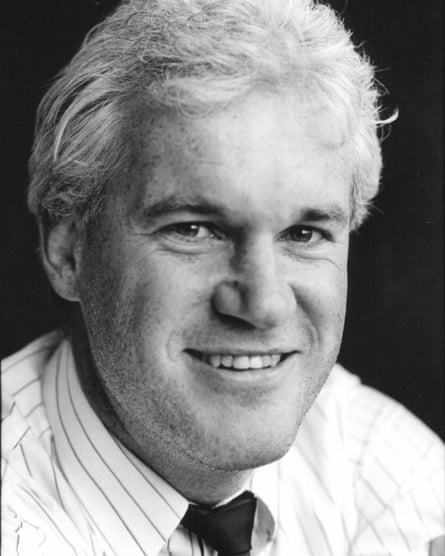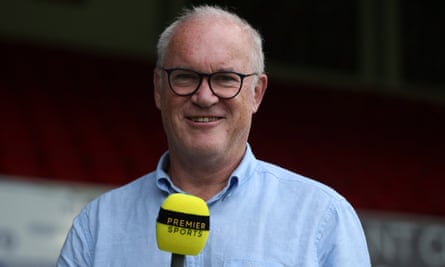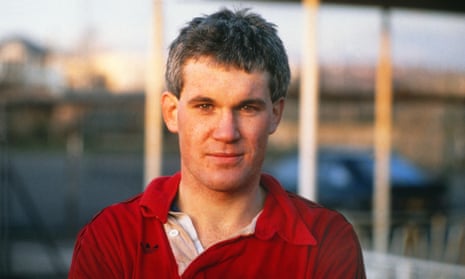Eddie Butler was a rarity in top-class sport. He became more famous once his playing days were over for his work as a broadcaster, journalist and novelist. The one-time captain of Wales was the natural heir of the “voice of rugby”, Bill McLaren, with whom he shared the BBC commentary box in his early days as a broadcaster. Butler became, more specifically, the voice of Welsh rugby, his mellow tones from those chilly, winter afternoons high in TV gantries and press boxes warming the listener, while his printed words on the game equally delighted readers of the Observer and Guardian.
Butler, who has died in his sleep at the age of 65 during a walking expedition for charity in Peru, was universally admired in the worlds of rugby and journalism. With one of his daughters, Nell, he was raising money for prostate cancer on the hike to Machu Picchu. Butler, who played 16 times for Wales and was called up as a replacement for the Lions in New Zealand in 1983, was a tireless charity fundraiser.
The BBC also wheeled Butler out when big, multi-sport events were taking place, his seemingly effortless bardic style bringing them to life. Some of his finest broadcasting work came in the form of montages and voiceovers during the London Olympics of 2012.

Born in Newport, south-east Wales, Butler was a first-generation public schoolboy and a first generation Welshman. One of his grandfathers was a brickie in the steelworks in Scunthorpe, Lincolnshire. His grammar school-educated father, Kenneth, was a research chemist who played amateur football for Wycombe Wanderers and three times for English representative sides as an inside-forward. Eddie’s mother, Margaret (nee Asplen), was a Londoner and later the couple ran a guesthouse in Raglan, Monmouthshire. Eddie went to Monmouth school, on the border of England and Wales, an institution reluctant to select players for Wales school sides. Monmouth, though, knew they had a real talent long before their pupil went to Fitzwilliam College, Cambridge, to read French and Spanish (1976-79).
In the Cambridge team, Butler brought a physical edge to a pack coached by the former Scotland international Ian Robertson, who was also to become a well-known rugby voice on the BBC. In the summer break the teenager was introduced to the Pontypool club, a more villagey, earthy Valleys side than the traditional east Wales big clubs, Cardiff and Newport. Pontypool played on a public park, but were making a name for themselves in Welsh rugby, often not in a good way. Nicknamed the Viet Gwent, they notoriously took no prisoners with their hard-nosed pack of forwards, spearheaded by the Wales front row of Charlie Faulkner, Bobby Windsor and Graham Price. They were coached by the fierce disciplinarian Ray Prosser, but Eddie the varsity youth, with his cultured tones and inevitable nickname Bamber, after the University Challenge presenter, fitted in with Pontypool’s ethos. Prosser realised that Butler, with his analytical, calmer approach to the game, could bring something extra to his side, and by 1979 the great Wales coach Carwyn Jones was canvassing for the 21-year-old Butler to be captain of the Wales B team.
By 1980 Butler had won his first cap in the defeat of France in Cardiff. By 1983 he was captaining the Wales side while working as a teacher at Cheltenham college, whose Cotswold stone cloisters were a world away from the slag-black surroundings of Pontypool. But by the time his international career was over in 1984, the No 8 had become slightly disillusioned with life in the goldfish-bowl of Welsh rugby. He found the vitriol among supporters and the media in Wales over the top for then amateur sportsmen.
He was particularly offended by a piece in the Western Mail, a paper with little love for Pontypool, comparing him unfavourably with the French captain Jean-Pierre Rives, the warrior flanker with his blood-stained shirt. The suggestion was that Wales’s leader was not passionate enough. The experience would later colour Butler’s journalism – in print particularly he was sympathetic to the players plying their rough trade.

After captaining Pontypool between 1982 and 1985, Butler had a brief spell as a press and publicity officer at Radio Wales before beginning a career in newspaper journalism with the shortlived Sunday Correspondent (1989-90) and later the Observer and Guardian, before also returning to the BBC as a journalist. He particularly enjoyed having the Sunday pulpit to himself at the Observer rather than the daily grind at the Guardian.
Butler took over from McLaren as the BBC’s senior commentator in 2002. There he struck up a partnership with another former Wales international, Jonathan Davies, and an odd-couple relationship with the one-time English hooker Brian Moore. The Yorkshireman, with his permanently peeved tone, and Eddie with an easygoing style which suggested that rugby was not the most important thing in the world, should not have worked, but it did, and the two became great friends over the years.
Butler later became a published author. His novel, The Head of Gonzo Davies (2014), featured a rugby-playing supporter of Welsh independence, a thinly veiled autobiographical work about a back-row forward who has played for Wales but returns to his village in the valleys where the street lights have long gone outside the old rugby clubhouse.
From his first marriage, to Jennifer Jones, Butler had three children, Rebecca, Hannah and Jack. After their divorce, he married Susan Roberts, with whom he had a further three children, Jacob, Nell and Seth. Susan and his children survive him.

Comments (…)
Sign in or create your Guardian account to join the discussion